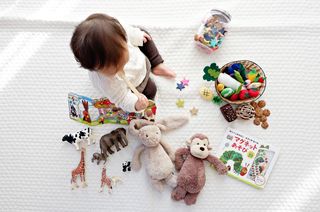Play
It's More Than Child's Play
Three key ways play helps your toddler's development.
Posted February 24, 2020 Reviewed by Lybi Ma

The toddler years, ages 12 months to 36 months, are a time of great cognitive, motor, emotional, and social development. But how does a toddler navigate through this developmental journey, you ask? Through play. Toddler play is an important tool used for many aspects of this critical developmental period. In the life of a toddler, play is serious business. On the surface, toddler play may look like random acts of fantasy frolic, make-believe fun and games, or moments of well-deserved breaks (for both toddler and parent). In fact, however, play helps your toddler to develop and gain mastery in three critical areas—acting out important experiences, recognizing the difference between fantasy and reality, and learning to become more independent.
- Acting out important experiences: In the early stages of this developmental period, a toddler engages in pretend play. Towards the end of the toddler years, pretend play becomes more complex and the toddler spends time at imitation play. For example, simple play with feeding a favorite doll an invisible bottle may later develop play sessions with your toddler imitating your behaviors as she feeds her doll her peas and carrots. Imaginative play is critically important because it allows the toddler to role play and act out various experiences she may have had or some experience that is of interest to her such as feeding or dressing. Through imitation, a toddler models the behaviors of the key people in her life. Through play, she begins to experiment with decision-making on how to behave in the family and in the world.
- Recognizing the difference between fantasy and reality: Learning to engage with others socially is an important aspect of social and emotional development. Equally important is grasping the concept of fantasy versus reality. Early on, a toddler spends a great deal of time in fantasy thought and this is illustrated in their play. Mastering pretend and imaginative play helps the toddler begin to learn the difference between fantasy and reality. It is important that a toddler begin to understand the reality of what can and cannot happen. For example, a toddler who has mastered imaginative play knows that the teddy bear who is the teacher during her play is not a teacher at her daycare program.
- Learning to become more independent: Arguably, the most important developmental task for a toddler is to successfully begin the journey of becoming independent from their parents. At the beginning of this stage of development, the toddler sets about understanding that she is a separate person from her parents. Sounds great theoretically. But how does this actually translate in the real world? This expresses itself by willfulness, desire to have control, testing limits, frequent use of the word No and the infamous terrible two temper tantrums. Yet, these years and experiences are important to allow a child to begin expressing a greater need for independence and gaining control over themselves and the world around them. During these developmentally fast-paced years, a toddler is hard at work gaining control over toileting, food choices, clothing selection, and toy preferences. Mastering this very critical task of this stage gives a toddler a sense of security, confidence, and autonomy—a sense of being able to handle problems on her won. Without this mastery, she is left with a sense of inadequacy and self-doubt.
The power of play has a great impact on a toddler’s development. The rich lessons a toddler learns while hard at work at play are important for a child’s health, development, and well-being.


